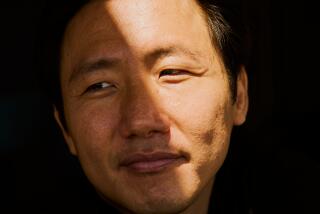The Petraeus affair: unscripted and simply scandalous
It’s “Homeland” meets “The Real Housewives” — and it’s hands down the best serialized show on TV.
It’s “Dallas” in military drag, in which a ridiculously retro social order (who knew that “socialites” and “hostesses” even existed anymore, never mind in Tampa) slams into the high-tech world of cyberstalking — only to reveal a story as old as the written word: The Case of the Compromising Love Letter.
Honestly, when will cheating couples finally learn to keep their declarations of passion out of anything that could conceivably be stolen by a lady’s maid, discovered by a suspicious spouse or unearthed by a cyber sleuth? Never, one hopes, or much of the world’s great literature, not to mention detective fiction, would collapse.
Stripped to its essentials, the Petraeus affair is a familiar enough narrative: Married man in power falls for a wide-eyed, admiring acolyte to the detriment of career, family and reputation. Happens all the time, or at least every six months or so — Clinton, Edwards, Sanford, Schwarzenegger, just to name a few. But it’s the brushwork that makes the masterpiece, and the details of the Petraeus scandal transfix the eye each and every time a new one is revealed.
First there’s the man himself, square-jawed, yes, but not terribly handsome, with those protruding ears and that receding hairline, still radiating competence nonetheless and more than that, a Middle American super-dad decency that almost belies his four-star status. Then there’s Paula Broadwell, the Harvard-educated biographer whose book was so unapologetically gushing that Jon Stewart, interviewing her before the scandal broke, asked her if David H. Petraeus was “awesome or incredibly awesome.”
And, oh, the shivery meta-media pleasure of watching Stewart now review those softball questions knowing what we/he knows now, or finding the whole original extended-version episode in which Broadwell banters with her cuckolded husband as they do his and her sets of push-ups for charity.
Still, if the narrative had been confined to Petraeus and Broadwell, even with his universally beloved status and his resignation mere days after a contentious election, the nation might simply have shared a raised-eyebrow pause and moved on.
PHOTOS: Love triangles of TV and film
But then we met Honorary Counsel Jill Kelley and there was no turning back.
It’s one thing for the head of the CIA to have an affair, even with a woman crazy enough to send anonymous emails to someone she perceives to be a rival; it’s another to learn that powerful generals regularly hang out with a woman who looks like she could go six rounds with NeNe Leakes. It was Kelley and her strange nexus of irritation and influence that lifted the Petraeus scandal out of the ho-hum arrogance/stupidity of men who think they will never get caught and the women who love them.
Reading descriptions of Kelley’s champagne and caviar parties, her Gasparilla Pirate Fest parties and sky diving with the troops, it is difficult not to envision a Lebanese American version of Joan Collins in “Dynasty” or perhaps Madeleine Stowe in “Revenge,” the grasping, scheming lovely who everyone instantly sees through, except whichever schmuck she happens to be making a play for at the time.
Who, in this case, appears to have included some of the military’s top male brass — trained intelligence officers who supposedly are able to spot a potential terrorist across a crowded room but who, apparently, don’t know a nakedly ambitious social climber when they’re posin’ for pictures with her.
This is why we cannot get enough of the Petraeus story: It has something for everyone. A fallen hero, a troubled smart girl, a cast of characters who seem destined for the Bravo or Lifetime. (What am I bid on the potential for Jill Kelley announcing a reality project in the near future? She has an identical twin for heaven’s sake!)
But it’s more than the story’s multiple narrative touchstones that compel us. There is something heartbreaking about it being Petraeus, who, unlike Clinton or Edwards or our former governor, has not cultivated a noticeable sexual swagger or a million-dollar smile.
So he must have, we imagine, simply fallen in love. And for all our carefully nurtured cynicism, our tales of the sexting and hook-up generation, we remain a nation in love with love, particularly forbidden love.
PHOTOS: Hollywood love triangles
Our books, our films, our television series steer us again and again to the thundering, fatal majesty of a love that makes all other concerns — jobs, friends, the respect of peers — superfluous.
It’s no accident that two of the winter’s biggest films are the final “Twilight” and “Anna Karenina,” in which, spoiler alert, people actually die for love.
In real life, similar choices often lead to climaxes far less romantic, denouements much bleaker, like the grimy napkin-littered space of a trendy dance club in the unforgiving light of midmorning. Petraeus reminds us, once again, that the choices we make, even when seeking the magic of the moment, have consequences.
And in a country with laws and mores still beholden to our Puritan founders, the only thing we like better than a good, juicy, twisty love story is a good, juicy, twisty love story with a moral at the end.
More to Read
The complete guide to home viewing
Get Screen Gab for everything about the TV shows and streaming movies everyone’s talking about.
You may occasionally receive promotional content from the Los Angeles Times.







